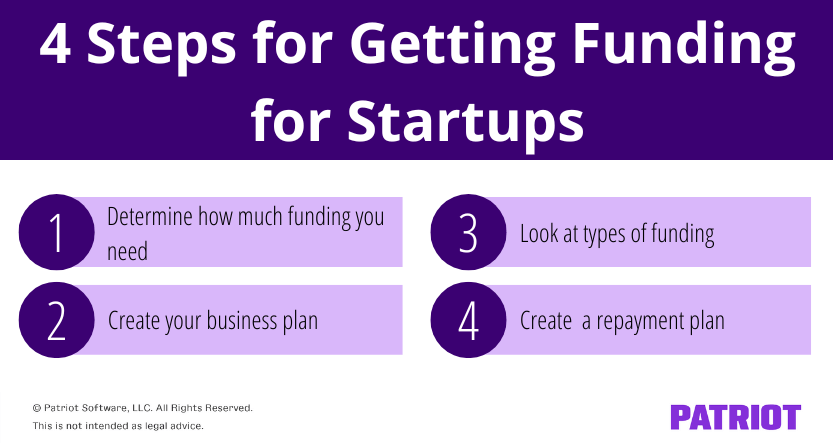Have an idea for a startup? Check. Think of a business name? Check. Have the funding you need to get started? Eh, not quite check. When creating a startup, you need to have a solid financial foundation to help your business succeed. And to do that, learn how to get funding for startup.
How to get funding for startup: 4 Steps
Getting funding is no easy task. It can take time to build up enough funds to help get your business off the ground or to expand your startup. To get funding for your startup, first follow these four steps.
1. Determine how much funding you need
Before you can apply for a business loan, pitch to investors, etc., you need to know how much money you need for your startup.
Maybe you need a smaller amount for now. Or, maybe you need a bigger loan to get things going. Whatever the case may be, determine how much you need ahead of time. That way, you can know exactly which funding route to go (e.g., investor or bank loan).
2. Create your business plan
Your business plan lays out everything from financing to your target market. And if you don’t have one, you may struggle with securing the necessary funding you need.
If you need to obtain outside funding (e.g., investors and lenders) for your startup, have an organized and up-to-date business plan ahead of time. Your plan should include details about:
- How much funding you need
- How you’ll fund your business
- What you will use funds for
- How you plan on paying back debt
Your business plan should also outline your market analysis, management, marketing and sales, financial projections, and offerings.
Whatever you do, don’t procrastinate on building your business plan. The last thing you want to do is miss out on funding opportunities.
3. Look at types of funding
Before you seek any type of funding, it’s best to look at the different financing options available out there.
There are plenty of funding options to choose from (which we’ll go over more later). Some small business financing options include:
- Loans
- Credit
- Family and friends
- Venture capitalist
- Crowdfunding
- Angel investor
- Personal funds
Do your research ahead of time to learn what each type of funding is, how it works, and the pros and cons of each option. After you narrow down your best options, you can create a game plan to obtain funding.
4. Create a repayment plan
Funding isn’t just free money you can use all willy-nilly for your business. You eventually have to pay it back. So to ensure you budget accordingly, map out how and when you plan on paying back the money you borrow.
You can use tools, like loan or credit card calculators, to help establish a repayment plan and work them into your business budget. If you can’t work the repayment into your budget, you may need to skip out on certain types of funding.

6 Ways to fund startup
Again, there are several options when it comes to financing your startup. The financing route you take may depend on what stage you’re at in the startup process, what you can afford to borrow, and how much funding you need.
Here are six options to look into when funding a startup business.
1. Loans
Getting a business loan is a popular option for startups. In fact, nearly 35% of startups get their funding from loans. When it comes to getting a loan, you may look into:
- Bank loans
- SBA (Small Business Administration) loans
A bank loan requires you to provide documentation, such as personal and business credit history, financial statements, a business plan, and cash flow projections. It can also be more challenging for startups to receive a bank loan. Before applying for any type of bank loan, consider how much debt you can take on, your credit score, and interest rates.
An SBA loan increases your chances of securing a small business loan. You can get anywhere from $500 to $5.5 million with an SBA loan. To qualify, you must have good personal credit, be a USA-based business that is for-profit, and meet the SBA’s small business size requirements.
2. Personal funds
A good chunk of startups (roughly 77%) use personal funds to get their ventures going. And if you’re like the majority, you may wind up doing the same.
Exclusively using personal funds for your business can be challenging, but 100% doable. However, you may need to make some adjustments to expenses to make it work (aka cutting out unnecessary subscriptions).
Before you use personal funds for your startup, do an in-depth financial analysis to make sure it’s a good solution for your business.
3. Venture capitalist
A venture capitalist (VC) is a person who provides capital investments in exchange for an ownership share and role in your company. A VC might be a good option if your business is fast-growing and doesn’t mind giving up a high percentage of your company.
4. Credit
Another financing method you can look into is a line of credit or business credit card for startups. Credit can give you spending flexibility. However, make sure you can make payments quickly and on time. Otherwise, you may end up owing more interest than you can afford.
Do your research to find out limits and interest rates before submitting any applications.
5. Angel investor
Angel investors are people who invest in small business startups in exchange for partial ownership. As you make a profit, part of the funds will go to your angel investor. Angel investors are similar to VCs, but they typically invest smaller amounts.
To receive funds from an angel investor, pitch your business to them and give them strong reasons why they should invest.
6. Grants
A business funding grant is money available to small businesses that meet certain criteria, such as business owners who are minorities or veterans. With a grant, you do not have to pay back the funds.
There are a variety of grants out there to apply for, so be sure to do your homework to find out if you’re eligible for any of them. You can apply for grants through government agencies, organizations, and private corporations.
Get the funding you need to start or expand your startup? Congratulations! Now it’s time to keep track of your finances. With Patriot’s accounting software, you can easily record income and expenses and know exactly where your money is going. Get a free trial today!
This is not intended as legal advice; for more information, please click here.



